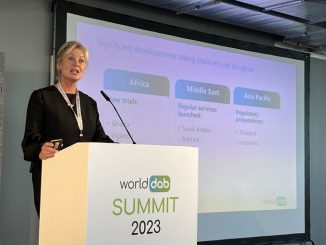Content from BPRTalk radio has been a mainstay of both commercial and public broadcasting for a very long time.It could be called “the original social media platform”……..giving listeners the chance to express their views to a wider audience and engage with the hosts.
Yes, Talk radio is expensive to run compared with music formats, but unlike other formats the content is difficult to replicate.That’s a USP!There are many reasons why Talk radio will survive and remain relevant in the future.Here are just a few:Audience Engagement. Talk radio offers a unique form of engagement, allowing listeners to speak with their favourite Talk personalities through talk back, social media or online chat. This interaction creates a sense of community among the audience, which is not found in other media formats.Local Relevance. Talk radio stations focus on issues and topics that matter to their listeners, again, providing a sense of community. Local news, weather, traffic, politics and discussions about concerns that are close to the listener equate to building a strong bond with the audience.Diverse Content. Talk radio covers a wide range of topics, from politics and current events to entertainment, health, lifestyle, sport etc.Accessibility and Convenience. Radio in all formats, talk or music, has always been easily accessible through traditional radio receivers, but it has also adapted to the digital age, with online streaming, podcasts and mobile apps. This adaptability ensures that listeners can tune in anywhere and at any time.Companionship. Great Talk radio hosts develop a personal connection with their audience, creating a sense of companionship. Listeners often turn to their favourite hosts for comfort, advice and entertainment, especially during long commutes or solitary moments. The personalities make the “complicated sound simple”……they explain the issues impacting their listeners’ lives in clear and concise terms.Zero Screen Dependency. Now we programmers already know this but it’s worth mentioning again. Unlike television, Netflix (etc) or YouTube, talk radio doesn’t require constant visual attention. People can listen while driving, working, exercising, or doing things around the house, making it a flexible choice for multi-tasking.Entertainment. Great Talk radio is highly entertaining (to fans of the format) not just informative. Regurgitating information without presenting it in an entertaining manner is a recipe for disaster in the digital age. This entertainment factor, driven by high profile personalities who understand the issues that matter to their listeners, is a powerful point of difference that provides longevity to the format.Challenges to Newer Mediums. Let’s face it…..many people like it when someone else does the work for them! While streaming services and on-demand content have gained in popularity, they also have some downsides. Subscription costs, choice overload and the need to actively select content can lead to decision fatigue. There are many podcasts available that attempt to compete with Talk radio BUT the advantage Talk stations offer is a CURATED experience….it takes taking the decision making burden off the listener. Oh….and you can’t interact with a podcast!Loyal Listeners. Many talk radio shows have established a loyal fan base over the years. These devoted listeners often identify strongly with specific hosts or stations, making it less likely for them to abandon the medium in favour of newer alternatives.Aging population. Talk radio’s strength lies with the 50+ demographic, listeners who when they were teenagers never thought that one day they’d be listening to a Talk station. It’s just part of the lifecycle of radio listening. Now, the good thing for Talk radio is that, as we all know, the population is aging. In 1993, the 50+ demographic made up 25% of Australia’s population; in 2023, that figure is now 35% and will continue to grow.Opinion based Talk Radio. Opinion based (especially political) talk radio has a dedicated following due to its focus on specific beliefs and perspectives. Usually this defers to the conservative wing of politics. Listeners seeking a platform that aligns with their views can find solace and validation in talk radio shows that echo their beliefs.The late Rush Limbaugh is an excellent example of how to create great Opinion based Talk radio.And please remember, Rush started his career in radio as an announcer on CHR stations.His initial success as a Talk host in the US spawned a nation of imitators. Throughout the country hosts and executives heard Rush and concluded that the key to success was bashing the “liberal left” for three hours – or all day!Oddly that wasn’t Rush’s original mission. When Ed McLaughlin, the boss of ABC Radio Networks, launched Rush’s show an article appeared quoting Rush and his role.Rush said, “I’m here to inform, inform, inform.”Walter Sabo, the respected Talk programmer, was with Ed McLaughlin the day the article quoting Rush appeared.Walter Sabo: “Ed said to me, “I will have to talk to Rush about that. His most important job is to entertain.Following Ed’s conversation with him, Rush carried out his mission, he entertained while also informing.Rush did not get ratings and cash for espousing conservative views. There were other spokespeople who did that very well such as William F Buckley – an erudite conservative who never got ratings.Listening hard to Rush airchecks, he was mostly entertaining.How did he do that? First, he never offered duplicate arguments for his opinions. Every single day he presented brand new evidence and facts and stories to support his point of view. Secondly, he riffed.There were long periods featuring funny, human stories. Cat stories! Third, Rush understood radio to a pristine point of science. When he had nothing to say, he used the medium’s most powerful tool… silence!He understood the essential bond with the listener and therefore we never heard his producer on talkback, rarely, rarely, rarely a guest interview. Phone calls were extremely well screened, coached and ready for air. Sharp produced bits were designed to drive the conversation. The show was a show not a lecture.Today’s winning hosts don’t waste time forming political opinions, they invest their time in building an entertaining show.”As long as Talk radio continues to be in touch with the values and lifestyles of the audience and simultaneously entertains & informs i.e. inform entertainingly and entertain informingly, the future of the format looks great!!By David Kidd, BPRMain Pic: Shutterstock […]






